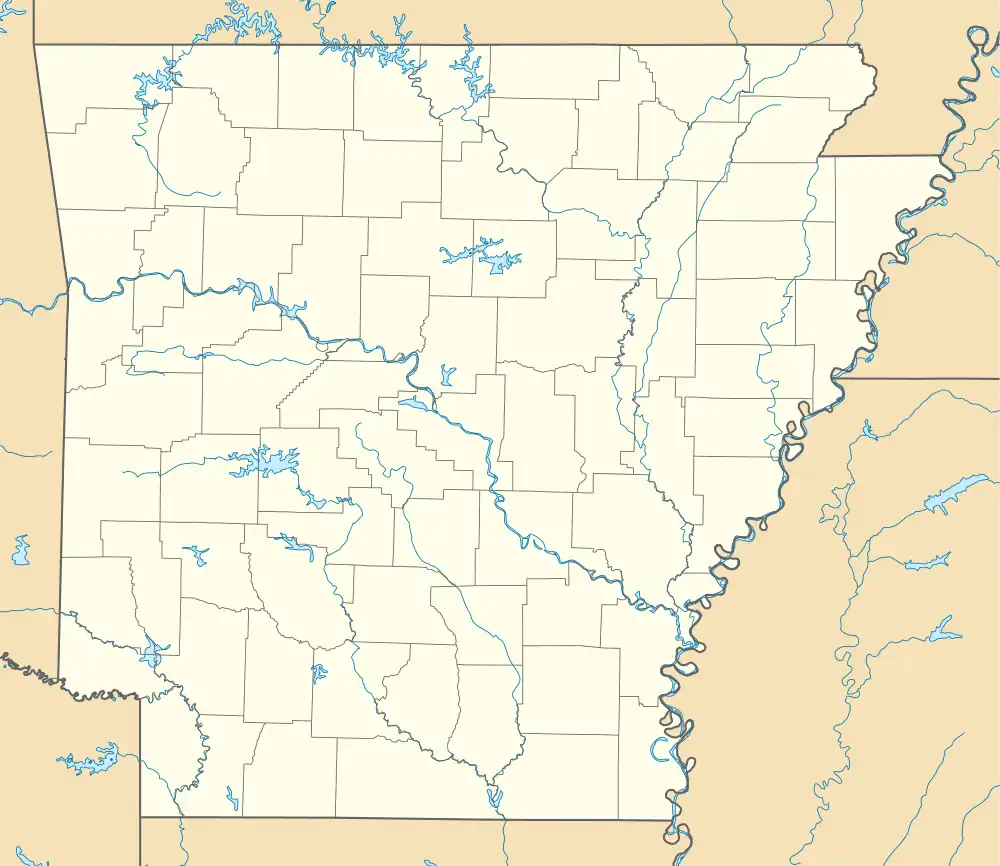Scott Plantation Settlement
The Scott Plantation Settlement is a private non-profit historical park located in Scott, Arkansas, on the Pulaski County and Lonoke County line, approximately twelve miles east of Little Rock, Arkansas (Pulaski County).
 Location in Arkansas  Location in United States | |
| Established | 1995 |
|---|---|
| Location | 15525 Alexander Rd Scott, Arkansas Pulaski, Lonoke |
| Coordinates | 34°42′55″N 92°3′13″W |
| Type | Historical Park |
| Website | https://www.https://scottsettlement.com |
History
The original owner of the land it sits on was Chester Ashley, was a prominent attorney, land speculator, and U.S. Senator. He was one of the first settlers to the area of Scott.
The land was gifted for the site creation by Virginia Alexander, and her daughter, Joan Dietz, is credited with the early organizing of the settlement park.
The dogtrot log house on at the settlement is believed to be the second oldest still existing in the state, built in 1840 by Ashley. Joan, her sister Virginia Downs, and cousin Martin Hawkins inherited a dogtrot log house upon the death of their uncle, George Alexander.
The family offered to donate the cabin to the Plantation Agriculture Museum in Scott in 1994. The Ozark Folk Center then expressed interest in the cabin, but Dietz and her mother decided to keep the house in the Scott area. When the Plantation Agriculture Museum declined the offer, Alexander donated more than eight acres to provide space for the relocation of “working buildings,” and her daughter received enthusiastic support from other plantation owners who donated buildings for placement at the settlement.[1] A planning group comprising local citizens in Scott formed the organizational structure of Scott Connections, Inc.,[2] in 1995. Title to the buildings and property was transferred to Scott Connections, Inc.
The first buildings consisted of three tenant houses representing different architectural styles, a blacksmith shop, a cotton pen, a hand-hewn cypress corncrib, the 1840s Ashley-Alexander dogtrot cabin, a medical clinic, an outhouse, a smoke house, the original W. P. Dortch, Sr. plantation “big house,” and a wash house. Since the initial placement of these buildings, the settlement has relocated thirteen additional structures, including a Cotton Belt railroad depot, a one-room plantation school, a cook's house, a working sorghum mill, an icehouse, a children's house, several tenant houses, a plantation office, a plantation bell and tower, and a split-rail fence.
The movement and restoration of the Cotton Belt Railroad Depot was made possible by a $50,000 grant from the Stella Boyle Smith Trust; that station is now the Stella Boyle Smith Orientation Center and houses the settlement's gift shop, Whistle Stop.[3]
Today
The park depicts early farming life from pre-statehood through early modern mechanization. The settlement is bordered by Ashley's Bayou, where the Union troops mustered before advancing on Little Rock. A Civil War interpretive sign explains the Battle of Ashley's Mill, part of the 1863 Little Rock Campaign conducted by Union General Frederick Steele that led to the fall of Little Rock in 1863. The historical marker on the southeast corner of the settlement commemorates this event.
The annual High Cotton on the Bayou event presents an interactive program allowing for participation in activities such as making butter and observing the milling process of sorghum molasses. The festival also interprets local history through educational information presented. The event occurs every first Saturday of October.
References
- Schnedler, Marcia. “Plantation Life in Scott Won’t Soon Be Forgotten.” Arkansas Democrat-Gazette. May 9, 1999, p. 2H.
- Scott Connections, Inc. https://scottsettlement.com/
- Easley, Suzanne. “Preserving Vernacular Architecture and Rural Community History at the Scott Plantation Settlement.” Research Paper, February 2003. Scott Connections Archives, Scott, Arkansas.